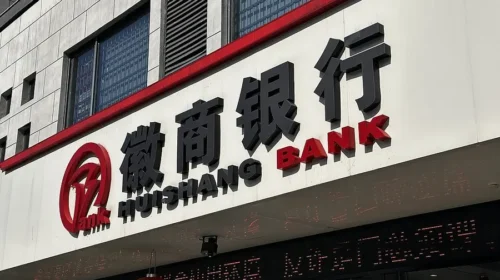Shenyang city ups offer for Shengjing Bank to end its misery as a listed company

A local government entity is trying to privatize the lender, which is reeling from the aftermath of troubles surrounding its former owner, China Evergrande Group
Key Takeaways:
- A government entity from the city of Shenyang has raised its buyout offer by about 20% to privatize Shengjing Bank
- The bank has been dealing with a double blow from China’s weak economy and the collapse of its former controlling shareholder, property giant China Evergrande
By Warren Yang
Keeping peace in its banking sector is proving costly for Chinese authorities as they try to maintain confidence in the country’s financial system.
Last Friday, regional lender Shengjing Bank Co. Ltd. (2066.HK), based in the Northeastern Chinese city of Shenyang, said its government-backed controlling shareholder, Shenyang Shengjing Financial Holding Investment Group, raised its buyout offer for the lender to take it off the Hong Kong Stock Exchange.
Shengjing Bank, majority-owned by the Assets Supervision and Administration Commission of Shenyang Municipal Government, which owns many of the city’s largest state-owned enterprises, is now dangling HK$1.60 per share, or 1.45 yuan, to entice investors to trade in their Hong Kong-listed H-shares and domestic ones. The new proposal is more than 20% higher than an original proposal made on Aug. 26, and Shengjing Bank has made it clear that this is the best and final offer that holders of the Hong Kong shares can expect.
“The offeror will not further increase the final offer price, and the offeror does not reserve the right to do so,” the bank said. “Shareholders and potential investors should be aware that, following the making of this statement, the offeror will not be allowed to increase the final H- share offer price and the final domestic share offer price.”
The last offer represents a 40% premium to Shengjing Bank’s last stock price before the initial privatization bid in August, and its total value is more than 20 times the company’s net profit for 2024. In absolute terms, Shenyang Shengjing, which already effectively owns about 37% of Shengjing Bank, is willing to fork out the equivalent of more than $1 billion to take full control of the lender.
If the deal is finalized, Shengjing Bank would operate under full state ownership as it continues trying to revive its fortunes that have deteriorated alongside those of its former controlling shareholder, China Evergrande Group — the troubled real estate developer that is being liquidated. Shengjing Bank’s takeover by the city of Shenyang in 2022 was a sort of bailout for the regional lender. And the latest costly privatization plan shows that Beijing doesn’t want to take chances when it comes to defending the stability of China’s vast financial system. Essentially, it’s clear that policymakers don’t want any bad apples in the banking sector to become the first domino to fall and spread troubles to others, including retail and institutional stock investors.
Shengjing Bank’s net profit has shrunk substantially in the past several years as its fortunes faded. Its shares have tanked in tandem, losing almost 80% of their value since the company’s IPO in 2014, even after a big rally sparked by the buyout offer. So, it seems like its hometown authorities believe the bank would be better off under their full control without investor scrutiny as a publicly traded company.
The otherwise low-profile regional lender came into the spotlight because of its ties to Evergrande, which was still flying high in China’s booming property market when it began buying Shengjing Bank shares in 2016 and amassed a 36% stake by 2019. The tie-up looked problematic to begin with due to concerns that the bank could lend to Evergrande on more lenient terms than to other borrowers, regardless of associated credit risks.
That indeed became a problem since Shengjing Bank was a major financier for Evergrande, whose liquidity crisis ultimately cascaded to the bank. An Evergrande unit failed to pay back billions of dollars owed to Shengjing Bank, which took legal action to try to recover the funds in late 2022. Just months before it took the action, Evergrande sold its last remaining shares in the bank to a Shenyang entity through an auction, completing a divestment process it initiated in 2021 as part of broader efforts to raise funds for debt reductions.
Hard life
With or without the Evergrande scandal, life was going to be hard for Shengjing Bank, which, like many of its peers, was struggling to deal with the same property slump that crippled Evergrande starting in the early 2020s. Real estate companies in general are a key borrower group for many regional lenders like Shengjing Bank. Its loan losses started swelling in 2020 to erase nearly two-thirds of its operating profit, with its nonperforming loan ratio jumping to more than 3% that year from less than 2% in 2019.
In 2023, Shengjing Bank received help from the government again to clean up its battered balance sheet, though in quite an unorthodox way. The bank sold some $24 billion of bad loans and investments to an asset management company (AMC) owned by the government of Liaoning province, where Shenyang is the capital city. The Chinese government has created AMCs to take over banks’ nonperforming loans (NPLs) and manage them, so such a transaction wasn’t too unusual.
But to raise funds for the purchase, the Liaoning AMC issued bonds to Shengjing Bank. So basically, the state institution borrowed from the bank to buy the bank’s bad debt, in a financial sleight of hand that relieved the bank of the NPLs on paper, but left it with bonds. Regardless, Shengjing Bank on the surface looks healthier after this asset disposal, contributing to the stability of China’s banking system.
Shengjing Bank’s NPL ratio dropped after the maneuver, but now it’s having trouble boosting its revenue and profits as economic conditions in China remain soft. Its net interest income dropped more than 20% last year, and its net profit fell 15% to 621 million yuan ($87 million), a fraction of what it earned during its heyday.
Shengjing Bank’s shares closed on Tuesday at HK$1.55, a slight 3% discount to the latest HK$1.60 buyout price. That gives them a high price-to-earnings (P/E) ratio of 23, well above many of its peers that typically trade at ratios of 5 or less. But its modest price-to-sales (P/S) ratio of 1.5 is more-or-less comparable to multiples for other Hong Kong-listed regional banks, such as 1.1 for both Huishang Bank (3698.HK) and Luzhou Bank (1983.HK).
The upside for Shengjing Bank’s valuation is likely limited in its current state, given the buyout offer is unlikely to be raised again and its financial performance isn’t promising. That means investors may be best off taking the latest offer to end their gamble on a Chinese banking sector whose prospects are unlikely to improve anytime soon.
To subscribe to Bamboo Works free weekly newsletter, click here






